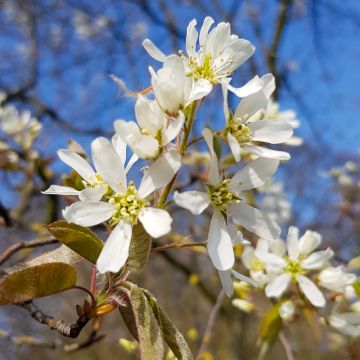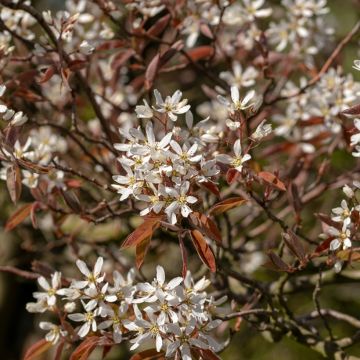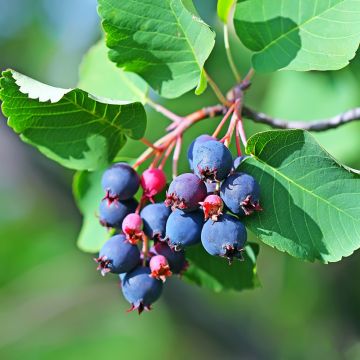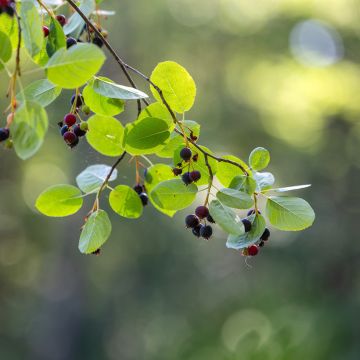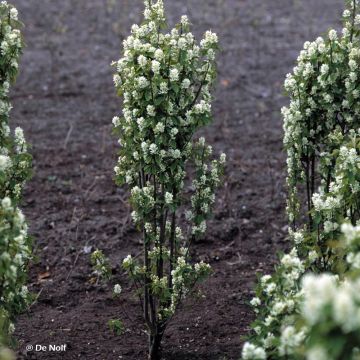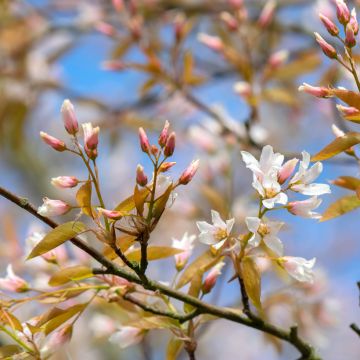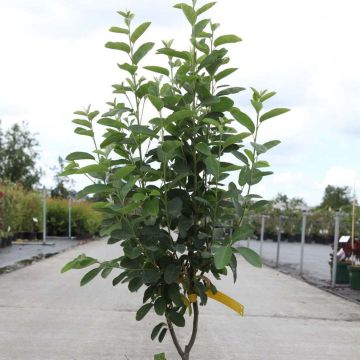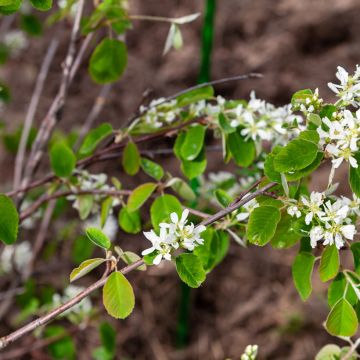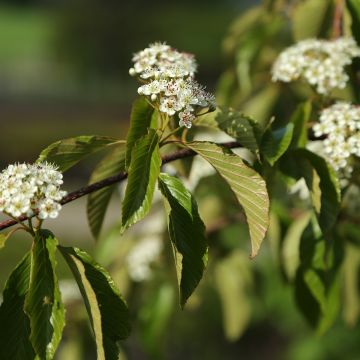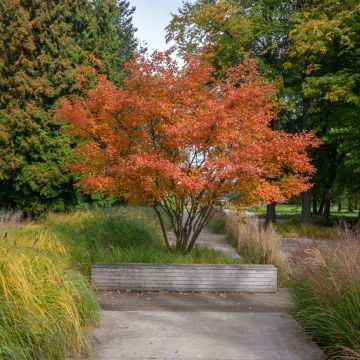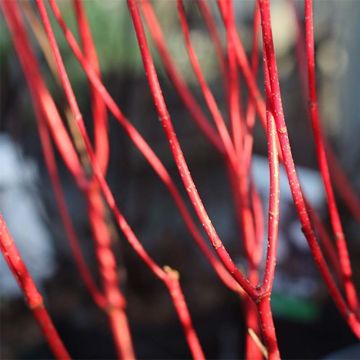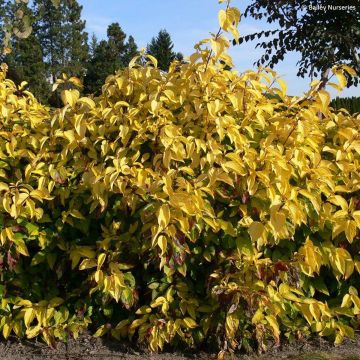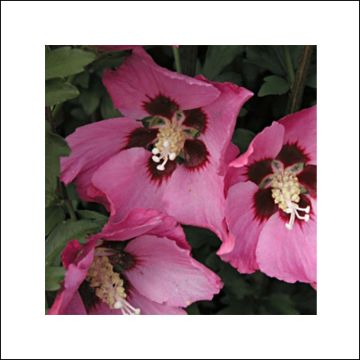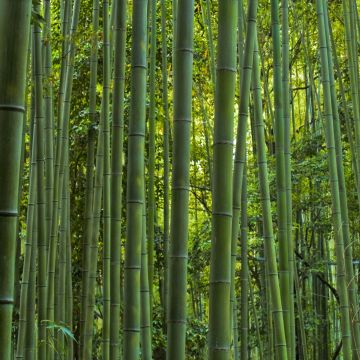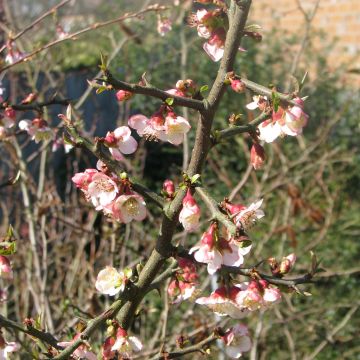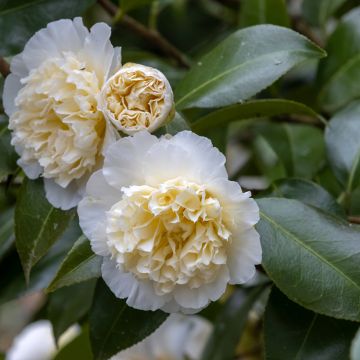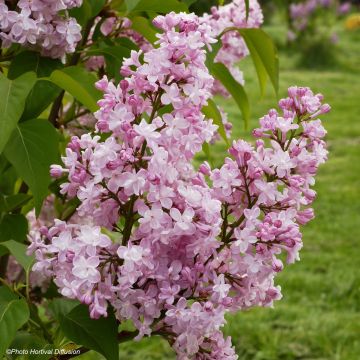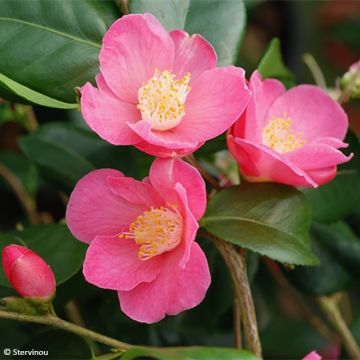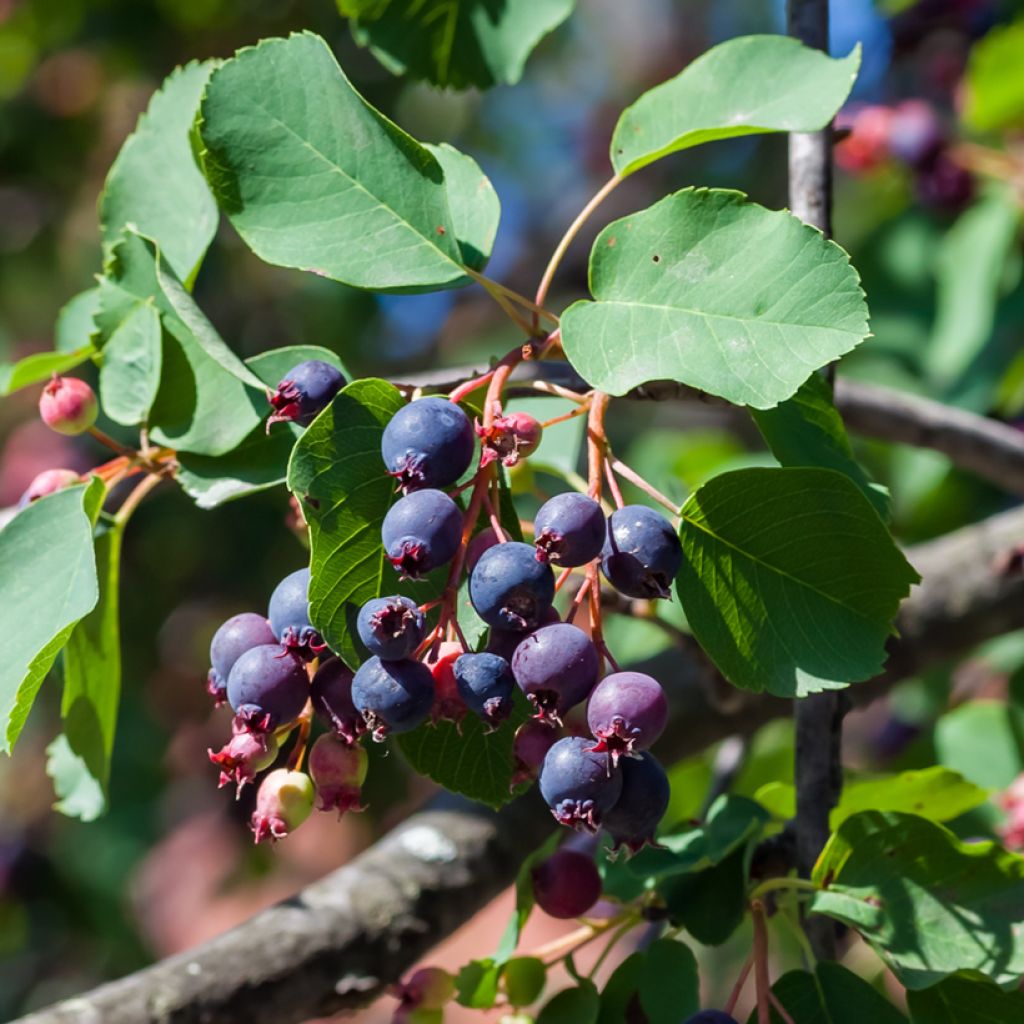

Amelanchier alnifolia GreatBerry Farm - Saskatoon
Amelanchier alnifolia GreatBerry Farm - Saskatoon
Amelanchier alnifolia GreatBerry® Farm Kojuaagf
Saskatoon, Juneberry, Serviceberry
Why not try an alternative variety in stock?
View all →This plant carries a 6 months recovery warranty
More information
We guarantee the quality of our plants for a full growing cycle, and will replace at our expense any plant that fails to recover under normal climatic and planting conditions.
From €5.90 for pickup delivery and €6.90 for home delivery
Express home delivery from €8.90.
Description
Amelanchier alnifolia GreatBerry Farm 'Kojuaagf' is a variety that forms a small tree with multiple trunks, an upright and spreading habit, reaching 4 m in height. It is a fruit tree native to North America, long appreciated for its edible, tasty, and highly nutritious fruits, known as 'saskatoon' by Native Americans. Following its white spring flowering, clusters of dark and sweet fruits emerge, with a flavour reminiscent of blueberries, apples, almonds, and hazelnuts. They are harvested in July and August from this non-early variety and can be consumed fresh, dried, in jelly, jam, or even in desserts and pastries. Amelanchiers are easy-going and very rewarding shrubs or small trees. They make excellent free-standing, hedgerow, or countryside shrubs.
Native to North America, from Alaska to Maine, the Amelanchier with alder-like leaves is a robust shrub from the large Rosaceae family, largely resistant to parasites and extreme cold. In nature, it is found along watercourses as well as in much less favourable environments, such as rocky slopes exposed to the wind. It thrives in rather acidic and moist soil, proving accommodating and capable of adapting to relatively dry and hot summers once established. To achieve a good harvest, provide it with fairly fertile soil and water when necessary.
Its habit is bushy and branching, taller than wide. With a rather slow growth, the shrub will reach about 4 m in height by 2.5 to 3.5 m in width at maturity. Its bark is grey to brown, sometimes tinged with red. Smooth when young, it becomes rougher over time. The abundant flowering occurs in April-May, at the end of bare young branches or already adorned with very young leaves, depending on the climate. Flowering and fruiting are rapid in this amelanchier, around the age of 3-4 years. The 2cm diameter white flowers with 5 petals and yellow stamens are clustered along the branches. They are followed by round, edible fruits resembling blueberries, called pomes. They turn almost black when ripe, in June. Their pleasantly sweet and aromatic flavour and juicy pulp allow them to be consumed fresh, cooked, as jam, or jelly. Recent analyses confirm their high content of antioxidant molecules, vitamins, and minerals. Saskatoons have a limited shelf life. They can be eaten fresh, frozen, dried, or preserved for later use. A single plant is sufficient to yield a harvest ranging from 3 kg up to 7-8 kg of fruits depending on soil fertility, but it is often recommended to plant two plants to optimise fruit formation.
The young spring leaves are fuzzy, becoming tougher later on. They display a pretty bluish-green hue, turning yellow in autumn before falling. Measuring up to 5 cm in length, they are entire, oval, serrated at the edges and arranged alternately on the branches.
Amelanchier GreatBerry Farm is a robust, undemanding, and charming fruit shrub that deserves a place in a countryside, informal, or fruit hedge. It can also be used in the background of perennial or lower shrub borders. It pairs beautifully with ornamental apple and cherry trees, deciduous euonymus, Japanese quince, spring spireas, hawthorns, medlar, plum trees, and many more. Create a fruit hedge by combining it, for example, with the may berry (Lonicera kamtschatica Sweet Myberry), garden blackberries, red currants, black currants, cranberries (Vaccinium macrocarpon), blueberry bushes, raspberry canes, Aronia, Japanese silverberry...
The name 'Saskatoon', an anglicisation of a word from the Cree people's language, can be translated as "the fruit of the tree with many branches". This fruit gave its name to the Canadian city of Saskatoon.
Report an error about the product description
Plant habit
Fruit
Flowering
Foliage
Botanical data
Amelanchier
alnifolia
GreatBerry® Farm Kojuaagf
Rosaceae
Saskatoon, Juneberry, Serviceberry
Cultivar or hybrid
Other Saskatoon - Juneberry
Planting and care
The GreatBerry Farm Amelanchier should be planted in spring or autumn in any good, well-drained garden soil, preferably moist or slightly damp, deep, in a sunny or semi-shaded position. It prefers slightly acidic to neutral soils but can tolerate some limestone. This bush, which does not like overly dry conditions, can, however, withstand moderate summer drought once well established. Water regularly to help it establish, especially during the first two dry summers. Mulch the soil to maintain some moisture, always after watering your amelanchier abundantly so that its roots do not develop only at the surface of the earth, which would make it more sensitive to water shortage.
Apply well-decomposed compost to the base of your bush every spring to support fruit production.
You can prune the bush from the first year to promote branching. Watch out for powdery mildew! Spray a sulphur-based fungicide preventively if spring is mild and very humid. Like all bushes in the rosaceae family, the amelanchier can be susceptible to bacterial fire.
Planting period
Intended location
Care
This item has not been reviewed yet - be the first to leave a review about it.
Hedge shrubs
Haven't found what you were looking for?
Hardiness is the lowest winter temperature a plant can endure without suffering serious damage or even dying. However, hardiness is affected by location (a sheltered area, such as a patio), protection (winter cover) and soil type (hardiness is improved by well-drained soil).

Photo Sharing Terms & Conditions
In order to encourage gardeners to interact and share their experiences, Promesse de fleurs offers various media enabling content to be uploaded onto its Site - in particular via the ‘Photo sharing’ module.
The User agrees to refrain from:
- Posting any content that is illegal, prejudicial, insulting, racist, inciteful to hatred, revisionist, contrary to public decency, that infringes on privacy or on the privacy rights of third parties, in particular the publicity rights of persons and goods, intellectual property rights, or the right to privacy.
- Submitting content on behalf of a third party;
- Impersonate the identity of a third party and/or publish any personal information about a third party;
In general, the User undertakes to refrain from any unethical behaviour.
All Content (in particular text, comments, files, images, photos, videos, creative works, etc.), which may be subject to property or intellectual property rights, image or other private rights, shall remain the property of the User, subject to the limited rights granted by the terms of the licence granted by Promesse de fleurs as stated below. Users are at liberty to publish or not to publish such Content on the Site, notably via the ‘Photo Sharing’ facility, and accept that this Content shall be made public and freely accessible, notably on the Internet.
Users further acknowledge, undertake to have ,and guarantee that they hold all necessary rights and permissions to publish such material on the Site, in particular with regard to the legislation in force pertaining to any privacy, property, intellectual property, image, or contractual rights, or rights of any other nature. By publishing such Content on the Site, Users acknowledge accepting full liability as publishers of the Content within the meaning of the law, and grant Promesse de fleurs, free of charge, an inclusive, worldwide licence for the said Content for the entire duration of its publication, including all reproduction, representation, up/downloading, displaying, performing, transmission, and storage rights.
Users also grant permission for their name to be linked to the Content and accept that this link may not always be made available.
By engaging in posting material, Users consent to their Content becoming automatically accessible on the Internet, in particular on other sites and/or blogs and/or web pages of the Promesse de fleurs site, including in particular social pages and the Promesse de fleurs catalogue.
Users may secure the removal of entrusted content free of charge by issuing a simple request via our contact form.
The flowering period indicated on our website applies to countries and regions located in USDA zone 8 (France, the United Kingdom, Ireland, the Netherlands, etc.)
It will vary according to where you live:
- In zones 9 to 10 (Italy, Spain, Greece, etc.), flowering will occur about 2 to 4 weeks earlier.
- In zones 6 to 7 (Germany, Poland, Slovenia, and lower mountainous regions), flowering will be delayed by 2 to 3 weeks.
- In zone 5 (Central Europe, Scandinavia), blooming will be delayed by 3 to 5 weeks.
In temperate climates, pruning of spring-flowering shrubs (forsythia, spireas, etc.) should be done just after flowering.
Pruning of summer-flowering shrubs (Indian Lilac, Perovskia, etc.) can be done in winter or spring.
In cold regions as well as with frost-sensitive plants, avoid pruning too early when severe frosts may still occur.
The planting period indicated on our website applies to countries and regions located in USDA zone 8 (France, United Kingdom, Ireland, Netherlands).
It will vary according to where you live:
- In Mediterranean zones (Marseille, Madrid, Milan, etc.), autumn and winter are the best planting periods.
- In continental zones (Strasbourg, Munich, Vienna, etc.), delay planting by 2 to 3 weeks in spring and bring it forward by 2 to 4 weeks in autumn.
- In mountainous regions (the Alps, Pyrenees, Carpathians, etc.), it is best to plant in late spring (May-June) or late summer (August-September).
The harvesting period indicated on our website applies to countries and regions in USDA zone 8 (France, England, Ireland, the Netherlands).
In colder areas (Scandinavia, Poland, Austria...) fruit and vegetable harvests are likely to be delayed by 3-4 weeks.
In warmer areas (Italy, Spain, Greece, etc.), harvesting will probably take place earlier, depending on weather conditions.
The sowing periods indicated on our website apply to countries and regions within USDA Zone 8 (France, UK, Ireland, Netherlands).
In colder areas (Scandinavia, Poland, Austria...), delay any outdoor sowing by 3-4 weeks, or sow under glass.
In warmer climes (Italy, Spain, Greece, etc.), bring outdoor sowing forward by a few weeks.

































